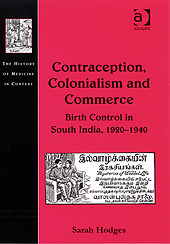Contraception, Colonialism and Commerce
Dr Sarah Hodges' book Contraception, Colonialism and Commerce: Birth Control in South India, 1920-1940 has just been published by Ashgate.
Birth control holds an unusual place in the history of medicine. Largely devoid of doctors or hospitals, only relatively recently have birth control histories included tales of laboratory-based therapeutic innovation. Instead, these histories elucidate the peculiar slippages between individual bodies and a body politic occasioned by the promotion of techniques to manipulate human reproduction. The history of birth control in India brings these as well as additional complications to the field.
Contrary to popular belief, India has one of the most long-lasting, institutionalized, far-reaching, state-sponsored family planning programs in the world. During the inter-war period the country witnessed the formation of groups dedicated to promoting the cause of birth control.
This book outlines the early history of birth control in India, particularly the Tamil south. In so doing, it illuminates India's rols in a global network of birth control advocacy. The book also argues how Indians' contraceptive advocacy and associationialism became and increasingly significant realm of action in which they staked claims not just about the utlity of contraception but simultaneously over their ability and right to self-rule.


